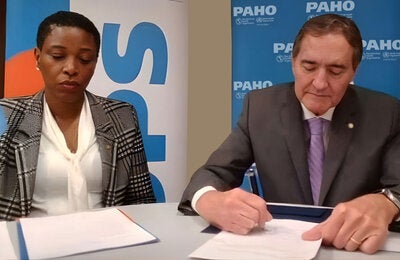Santiago, Chile, 01 March 2010 (PAHO) - The massive 8.8 magnitude earthquake that struck Chile in the early hours of Saturday, 27 February, has now claimed at least 708 lives, according to government officials. The death toll is expected to continue to rise as communications are restored with the most affected areas.
The health situation varies according to region. In the Northern region of Chile, from Arica to Valparaíso, the health network continues to function normally, with no major damage reported. Hospitals continue to function in the Santiago metropolitan area. Non-structural damage occurred in some facilities and patients were evacuated as a preventive measure. However, patients were moved back inside as clean up began.
In southern Chile, access to health services may be a major challenge. Six hospitals collapsed and two others were damaged severely and left unable to function. Four Chilean Air Force field hospitals are being set up with the capacity for 50-60 patients each, and there may be a need for additional temporary facilities to fill the gap left by the damaged facilities. There is currently a shortage of health personnel and therefore all staff are requested to report to work wherever possible.
The quake's major impact was on infrastructure. An estimated 500,000 homes have been seriously damaged. It is believed that adobe structures will be most affected and indigenous populations most at risk. More accurate information on the extent of damage in rural, isolated areas should be available over the next 24 to 48 hours.
The earthquake generated some tsunami activity. State television quoted emergency officials as saying that 350 people were killed in the coastal town of
Constitución, Chile, which was hit by the tsunami. In addition, in the coastal city of Concepción (hard hit by the earthquake itself), several hundred people may have been washed away by the tsunami. The threat appears to have passed and the Pacific Tsunami Warning Center called off the warning on Sunday morning.
According to the President of Chile, Dr. Michelle Bachelet, the government is identifying areas that will require international aid (among others, field hospitals and electric generators for hospitals).
Chile's Ministry of Health and the National Emergency Office of the Ministry of the Interior (Oficina Nacional de Emergencias del Ministerio del Interior / ONEMI) are very well-organized and have significant experience in disaster preparedness, readiness and response. The Pan American Health Organization has daily meetings on the ground with the Ministry of Health and regular contact with ONEMI. PAHO/WHO is supporting the government of Chile by contacting Member States in the Americas to determine the availability of field hospitals and generators and coordinate their deployment.
A PAHO/WHO disaster management expert is in Chile to support the PAHO/WHO Country Office. He will become part of a Ministry of Health-led assessment of the status of health facilities in the affected area. Two additional disaster managers are on standby and ready to be mobilized as required. A technical information specialist will also arrive in Santiago tomorrow to support information management needs.
The PAHO/WHO Country Office in Santiago sustained damage and cannot be reoccupied until a structural assessment is completed. In the meantime, PAHO/WHO will continue to operate on the premises of the Economic Commission for Latin America and the Caribbean (ECLAC) in Santiago.
Latest news



